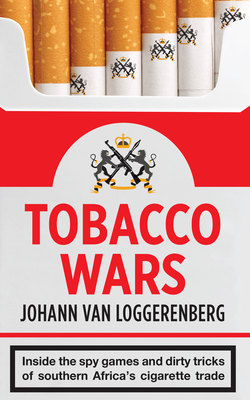Читать книгу Tobacco Wars - Johann van Loggerenberg - Страница 5
На сайте Литреса книга снята с продажи.
Foreword
ОглавлениеIn the pages that follow, Johann van Loggerenberg takes us through one of our darkest days since the dawn of democracy. Coinciding as it does with efforts to rebuild SARS, Tobacco Wars is a timely and essential story that should be prescribed reading material for lawmakers, civil servants, regulators, civil society organisations and the media, as well as alert citizens concerned with the protection of key institutions of the state against greedy and corrupt mercenaries for profit.
What Van Loggerenberg tells us in these pages is more than just the story of dedicated civil servants at SARS falling victim to unbridled greed; it is also a lesson in how we as a nation failed to properly exercise our hard-won democratic right to safeguard that which we should hold precious and dear.
As he did in his previous two books, Rogue, and Death and Taxes, Van Loggerenberg has in Tobacco Wars told how a professional, efficient and progressive tax collection agency was gutted by determined and unaccountable officials.
Not only was the institution hollowed out, families were destabilised, and the lives and livelihoods of hardworkng and honest civil servants were destroyed. Yet good men and women have refused to just sit by and give up. Hence you are reading this book, which tells the story of capture and plunder, courtesy of one of the bravest former dedicated civil servants.
The story of the illicit tobacco trade is intrinsically linked to, and is the extension of, the story of state capture. The treasonous crime of state capture could not have succeeded without the hollowing out of SARS. In fact, SARS was for a long time the only government agency that stood in the way of the criminal gangs. In order for the crime to flourish, SARS had to go the way of the South African Police Service. And flourish the crime did.
The success of this campaign of crime over the past ten years, in which elected public office bearers commandeered civil servants to tirelessly work for the private profit of their friends and underworld paymasters, starkly shows itself in the increasing taxes ordinary people are forced to endure daily.
In the 2019 national budget, Finance Minister Tito Mboweni raised taxes on essentials such as bread, flour and fuel, in order to pay for the corruption of state capture. This Mboweni did in order to find about R12 billion more in taxes to pay for the corruption at Eskom and elsewhere in government. The 2018 jump in the VAT rate to 15% of the price of goods can and must also be directly linked to SAR’s inability to collect all taxes due on tobacco and organised commercial crimes.
For the next two to four years, the country will have no choice but to raise taxes to pay for the ever-increasing funding needs of a poorly performing economy. An economy riddled with crime, such as ours, will tap the already burdened taxpayer. That will be the case until two things happen: the economy starts generating more taxes and the investigative and enforcement capacity of SARS is completely rebuilt.
A 2018 study by the Tobacco Institute of Southern Africa shows that illicit tobacco costs the country about R8–R9 billion in unpaid taxes every year. Of course, as Van Loggerenberg shows, tax-paying tobacco companies themselves are not the most innocent bystanders in the hollowing out of SARS. Their strong objections to raised taxes on their products should be seen for what they really are: a self-serving agenda to maximise the profits of their members while letting them off the monetary costs of looking after the healthcare of customers, who become yet another burden of the heavily taxed public.
Which does not change the ugly reality and cost of the illicit tobacco trade on the nation. Nor is this to say that other organised commercial crimes are less important. In such an impoverished country as South Africa, unregulated and untaxed cigarettes place an additional burden of care on the already collapsing public healthcare sector, which hits the poor particularly hard.
To reverse this rot, and to begin to deliver on the South African promise for the most vulnerable of our compatriots, institutions like SARS have to be built anew. What South Africans should care most about is safeguarding the institutions and the civil servants whose dedication to the cause of a progressive nation is essential to delivering a just and more equitable future.
Readers of this book will do well to pass it on to younger generations of South Africans who must also take it upon themselves to ensure public institutions thrive in order to deliver on the democratic dividend for which so many have sacrificed so much.
Sikonathi Mantshantsha
Deputy editor: Financial Mail
